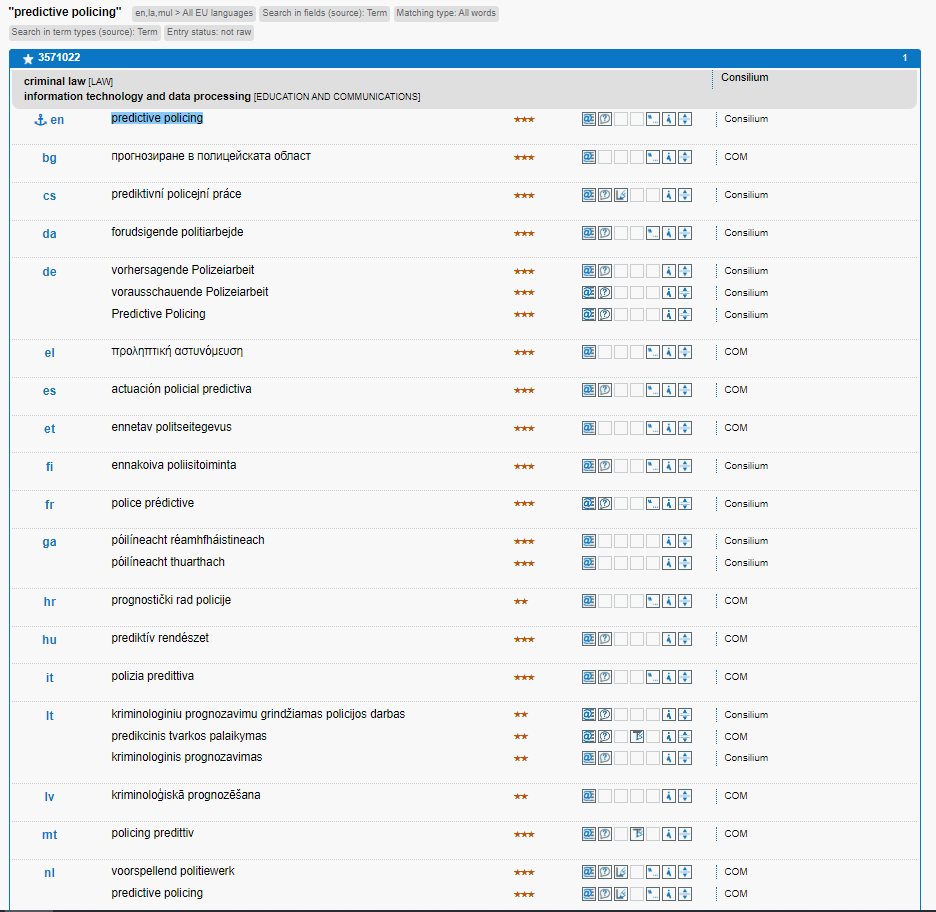Due to the development of new artificial intelligence technology, the discussion over what restrictions should be put in place to ensure privacy, transparency, and people’s rights without impeding innovation is in the spotlight nowadays. The Artificial Intelligence (AI) Act, put forth by the European Commission in 2021, is the first set of guidelines for artificial intelligence regulation in the world.
In June 2023, MEPs proposed an amendment of the list of potentially intrusive or discriminatory AI practices included in the AI Act. One of the points under discussion is predictive policing based on profiling, location or past criminal behaviour. So, what is predictive policing?
IATE defines the term as ‘usage of mathematical, predictive and analytical techniques in law enforcement to identify potential criminal activity’.

Predictive policing algorithms are used to forecast potential threats, meaning where, when, and who may be involved in criminal activity. When used ethically and transparently, this technology can help with resource allocation, law enforcement, and crime prevention.
So far, it is easy to be in favour of this revolutionary technology, which aims to improve public safety. To understand why the matter is so contentious, however, we must first understand how the algorithm works.
Predictive policing is a data-driven approach, meaning that predictive models are trained over large datasets of past crimes. The first concern is about potential privacy violations. The second concern refers to the possibility for datasets to contain biased policing practices or to reflect existing inequalities, and to have therefore the potential to perpetuate the same biases. Additionally, the use of data obtained from the results of the algorithms generates new, similar data, which feeds into a cycle of skewed outcomes.
In conclusion, predictive policing represents a complex and evolving approach aiming to leverage data and technology to anticipate and prevent crime. Concerns have arisen regarding the potential for amplified discrimination against specific individuals or communities, and the topic has faced significant opposition at EU level. However, efforts are being made to improve the fairness of predictive policing algorithms. To address the concerns, the European Union Agency for Fundamentals Rights (FRA) suggests measures, such us assessing the quality of the training data, evaluating algorithms, and promoting transparency.
References
European Parliament. (May, 2023). AI Act: a step closer to the first rules on Artificial Intelligence. Retrieved from European Parliament News: https://www.europarl.europa.eu/news/en/press-room/20230505IPR84904/ai-act-a-step-closer-to-the-first-rules-on-artificial-intelligence
European Parliament. (June, 2023). Artificial Intelligence Act: press conference 14/6 at 13.30 CEST with President and co-rapporteurs. Retrieved from European Parliament News: https://www.europarl.europa.eu/news/en/press-room/20230612IPR97501/artificial-intelligence-act-press-conference-with-president-and-co-rapporteurs
European Parliament. (June, 2023). EU AI Act: first regulation on artificial intelligence. Retrieved from European Parliament News: https://www.europarl.europa.eu/pdfs/news/expert/2023/6/story/20230601STO93804/20230601STO93804_en.pdf
Hung, TW., Yen, CP. (June, 2023). Predictive policing and algorithmic fairness. Retrieved from Synthese 201, 206: https://link.springer.com/article/10.1007/s11229-023-04189-0
Pingen, A. (March, 2023). FRA Report on Use of AI in Predictive Policing and Offensive Speech Detection. Retrieved from Eucrim: https://eucrim.eu/news/fra-report-on-use-of-ai-in-predictive-policing-and-offensive-speech-detection/
Written by Annalisa Ranzenigo

Born in Italy, Annalisa has participated in several projects on language technology, tourism, culture bridging, and environmentally friendly practices across Europe. She holds a double Master’s degree in technologies for translation and interpreting (with specialisations in computational linguistics and natural language processing), obtained under the Erasmus Mundus program at the University of Malaga in Spain and the University of Wolverhampton in the UK. She plans to continue travelling and learning, and wishes to contribute to the innovation process in the linguistic sector in the future.

